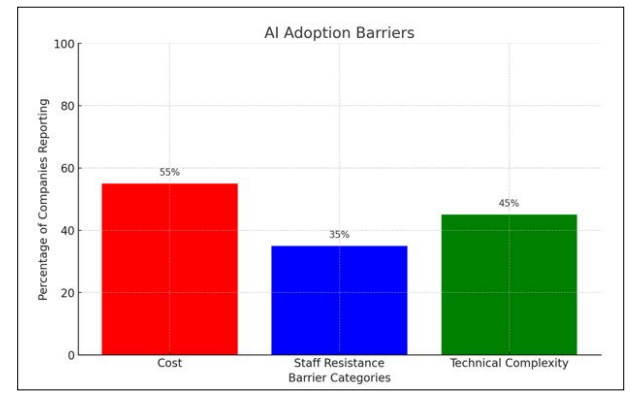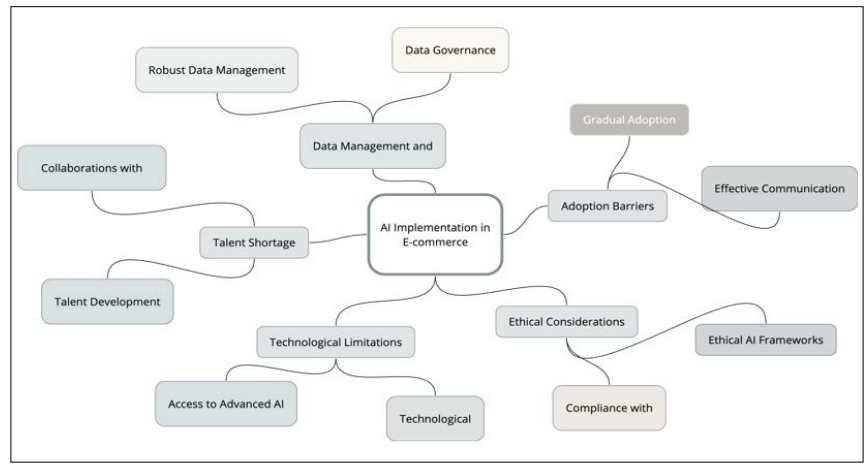Challenges in Implementing AI in E-Commerce and How to Overcome Them
Author(s): Alok Reddy Jakkula
Abstract
The rapid growth of e-commerce has led to an increasing demand for efficient and personalized customer experiences. Artificial Intelligence (AI) has emerged as a powerful tool to address these challenges, offering a wide range of applications in the e-commerce industry. However, the implementation of AI in e-commerce is not without its own set of challenges. This research paper aims to explore the key challenges in implementing AI in e-commerce and provide practical solutions to overcome them. The paper delves into the problem statement, discusses potential solutions, examines the various use cases of AI in e-commerce, and analyzes the impact and scope of AI implementation. By addressing these challenges, e-commerce businesses can leverage the full potential of AI to enhance customer satisfaction, improve operational efficiency, and gain a competitive edge in the market.
Introduction
The rapid growth of e-commerce has transformed the way businesses interact with their customers. In this highly competitive landscape, e-commerce companies are constantly seeking innovative ways to enhance customer experience, improve operational efficiency, and gain a competitive edge. Artificial Intelligence (AI) has emerged as a powerful tool to address these challenges, offering a wide range of applications in the e-commerce industry.
AI-powered solutions can help e-commerce businesses personalize the shopping experience, optimize product recommendations, automate customer service, and streamline logistics and supply chain management. However, the implementation of AI in e-commerce is not without its own set of challenges. This research paper aims to explore the key challenges in implementing AI in e-commerce and provide practical solutions to overcome them.
Problem Statement
While the potential benefits of AI in e-commerce are well- recognized, there are several challenges that hinder its effective implementation. These challenges include:
- DataManagementandQuality: E-commerce businesses often struggle with the management and integration of large, complex, and diverse data sets required for AI-powered Ensuring data quality, consistency, and security is crucial for the success of AI implementation.
- AdoptionBarriers: E-commerce companies may face resistance from employees, customers, or stakeholders in adopting AI- powered solutions due to concerns about job displacement, privacy, and trust in the technology.
- Ethical Considerations: The use of AI in e-commerce raises ethical concerns, such as algorithmic bias, privacy violations, and the impact on vulnerable populations. Addressing these ethical considerations is crucial for building trust and maintaining a positive brand image.
- TechnologicalLimitations: The current state of AI technology may not always be able to meet the specific requirements of e-commerce businesses, such as real-time decision-making, natural language processing, and computer vision capabilities.
- Talent Shortage: The implementation of AI in e-commerce requires specialized skills and expertise, which can be in short supply, making it challenging to build and maintain an effective AI team.
Solution
To overcome these challenges, e-commerce businesses can adopt the following strategies:
- Robust Data Management: Implement a comprehensive data management strategy that includes data collection, integration, cleaning, and storage. Utilize data governance frameworks and invest in data infrastructure to ensure data quality and security.
- GradualAdoptionand Change Management: Adopt a phased approach to AI implementation, starting with pilot projects and gradually scaling up. Engage employees, customers, and stakeholders through effective communication and training to address adoption barriers.

Figure 1: Bar Graph Visualizing the Common Barriers to AI Adoption among Companies
- Ethical AI Frameworks: Develop and implement ethical AI frameworks that address concerns around algorithmic bias, privacy, and the impact on vulnerable populations. Collaborate with industry experts and regulatory bodies to ensure compliance with ethical standards.
- Technological Partnerships: Leverage partnerships with AI technology providers and research institutions to access the latest advancements in AI capabilities and address the specific needs of the e-commerce industry.
- Talent Development: Invest in upskilling and training programs to build an in-house AI talent Collaborate with educational institutions and industry organizations to attract and retain skilled AI professionals.

Figure 2: Mindmap Illustrating AI Implementation Challenges and Solutions in E-commerce, Highlighting Specific Strategies to Address Key Issues Such as Data Management, Adoption Barriers, Ethical Considerations, Technological Limitations, and Talent Shortages
Uses of AI in E-Commerce
AI-powered solutions have a wide range of applications in the e-commerce industry, including:
- Personalized Product Recommendations: AI-powered recommendation engines can analyze customer behavior, preferences, and purchase history to provide personalized product recommendations, enhancing the customer experience and increasing sales.
Pseudocode illustrating the logic behind the AI-recommendation engine:
function recommend_products(user): historical_data = fetch_user_history(user) preferences = analyze_preferences(historical_data) recommended_products = []
for product in inventory:
if match(preferences, product.features): recommended_products.append(product) return recommended_products
- Chatbots and Virtual Assistants: AI-powered chatbots and virtual assistants can provide 24/7 customer support, handle inquiries, and assist with order placement and tracking, improving customer satisfaction and reducing operational costs.
- Predictive Analytics: AI-powered predictive analytics can help e-commerce businesses forecast demand, optimize inventory management, and streamline logistics and supply chain
- Automated Content Generation: AI can be used to generate personalized product descriptions, marketing content, and social media posts, improving the efficiency of content creation and enhancing the customer experience.
- Computer Vision and Image Recognition: AI-powered computer vision and image recognition can be used for product categorization, visual search, and virtual try-on features, improving the shopping experience and reducing returns.
Impact and Scope of AI in E-Commerce
The successful implementation of AI in e-commerce can have a significant impact on various aspects of the business, including:
- Enhanced Customer Experience: AI-powered solutions can personalize the shopping experience, provide faster and more accurate customer support, and offer innovative features that improve customer satisfaction and loyalty.
- Improved Operational Efficiency: AI can optimize inventory management, logistics, and supply chain operations, leading to cost savings, reduced waste, and increased productivity.
- Increased Revenue and Profitability: Personalized product recommendations, targeted marketing, and improved operational efficiency can result in increased sales, higher conversion rates, and improved profit margins.
- Competitive Advantage: The strategic use of AI can help e-commerce businesses differentiate themselves from competitors, stay ahead of industry trends, and gain a competitive edge in the
The scope of AI in e-commerce is vast and continues to expand as the technology evolves. As e-commerce businesses embrace AI-powered solutions, the industry is poised to witness significant transformations in customer experience, operational efficiency, and overall business performance.
Conclusion
The implementation of AI in e-commerce presents both challenges and opportunities. By addressing the key challenges, such as data management, adoption barriers, ethical considerations, technological limitations, and talent shortage, e-commerce businesses can leverage the full potential of AI to enhance customer experience, improve operational efficiency, and gain a competitive edge in the market.
Through a strategic and phased approach to AI implementation, coupled with effective change management, ethical frameworks, and talent development, e-commerce companies can unlock the transformative power of AI and position themselves for long-term success in the rapidly evolving digital landscape [1-4].
References
- Chaffey D (2019) Digital business and e-commerce management. Pearson UK https://www.pearson.com/en-gb/subject-catalog/p/digital-business-and-e-commerce- management/P200000003910/9781292193366.
- Davenport TH, Ronanki R (2018) Artificial intelligence for the real world. Harvard Business Review 96: 108-116.
- (2020) Hype Cycle for Artificial Gartner https:// www.gartner.com/en/documents/3988463.
- Huang MH, Rust RT (2018) Artificial intelligence in Journal of Service Research 21: 155-172.
View PDF


